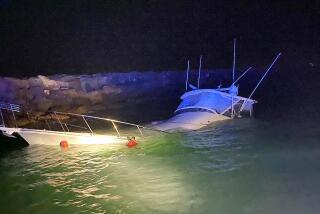48 Passengers Called Too Many for N.Y. Tour Boat
- Share via
LAKE GEORGE, N.Y. — The tour boat that sank Sunday, killing 20 passengers, should not have been carrying 48 people even though it was licensed to sail with that number, the lead investigator into the tragedy said Wednesday.
Stability tests of a virtually identical sister vessel failed to meet Coast Guard safety standards when officials loaded its deck with water-filled barrels Wednesday.
“We had to stop the test at three drums,” said Mark Rosenker, acting chairman of the National Transportation Safety Board. “It should have been eight drums in order for the vessel to pass.”
Since the tour boat Ethan Allen is undergoing cleaning and inspection in an airport hangar, officials used the boat’s twin. But the evidence confirmed that the Ethan Allen, christened in 1966 and grandfathered when the Coast Guard later standardized weight requirements, was overloaded when it turned into a wake and capsized. Officials are also investigating if alterations to the boat’s canopy added to its instability.
As the investigation continued Wednesday, officials said blood and urine taken from the boat’s captain, Richard Paris, would show if he had been drinking for up to 80 hours before he gave the samples Tuesday morning.
That would include the time the boat overturned Sunday at about 3 p.m.
The boat’s owner, Shoreline Cruises, has come under scrutiny because Paris was the only crewman on a boat that is required to have two crew members under state law. Both Paris’ and Shoreline’s licenses have been suspended.
Warren County Dist. Atty. Kathy Hogan said her office was watching the investigation and might pursue criminal charges.
“We have to look at this with a very critical eye,” she said.
In Albany, Gov. George E. Pataki said he would propose legislation that would require operators on state waters to undergo drug and alcohol tests after a fatal boating incident.
State law does not require boat operators to go through such tests, but Pataki said New York statutes should match or exceed regulations on federal waterways where those tests were mandatory.
More to Read
Sign up for Essential California
The most important California stories and recommendations in your inbox every morning.
You may occasionally receive promotional content from the Los Angeles Times.













